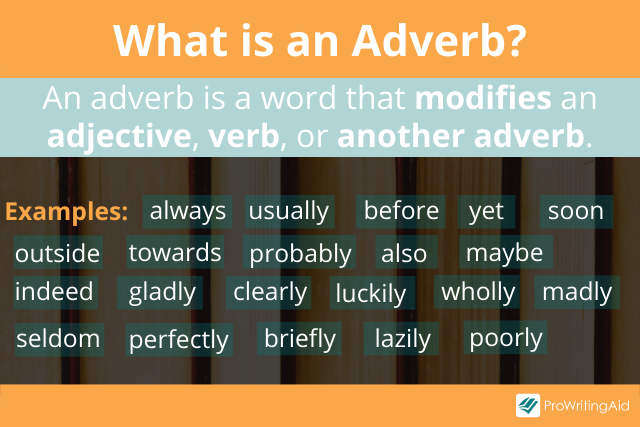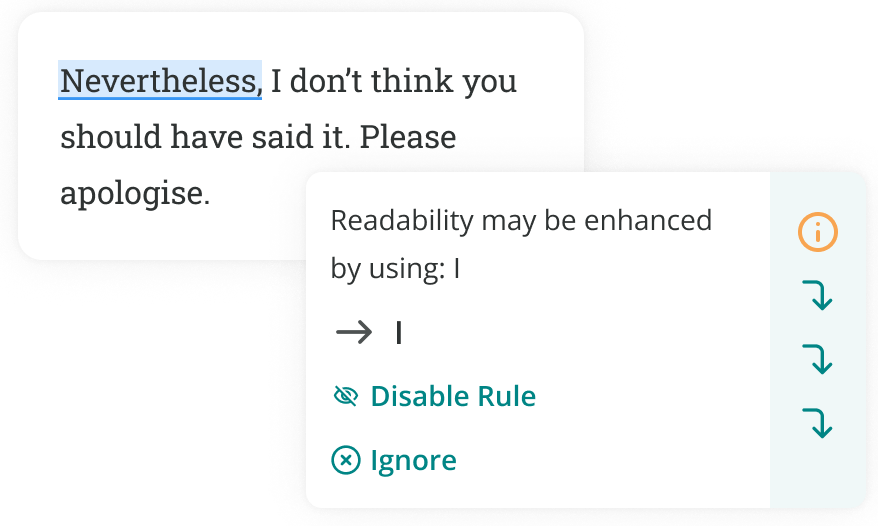
Adverbs can be a useful tool to add more descriptive detail to your writing.
If you’re looking for great adverbs in the English language to add to your vocabulary, you’ve come to the right place! This article will give you a list of over 300 amazing adverbs to help you spice up your writing.
Quick Refresh: What Is an Adverb?
An adverb is a word that modifies an adjective, verb, or another adverb. Many adverbs end with -ly, though not all of them do.
Adverbs can provide many kinds of specific details, such as degree, frequency, manner, time, and more. By using an adverb, you can give the reader a more detailed picture of what you want to convey.

For example, consider the sentence “Sarah laughed.” This sentence tells the reader what Sarah is doing, but not how she’s doing it. Adding an adverb might completely change how the reader pictures this action, such as:
- Sarah laughed cruelly.
- Sarah laughed joyfully.
- Sarah laughed sarcastically.
Notice how the feeling of Sarah’s laughter changes in each sentence, thanks to the descriptive adverb at the end.
When Should You Use Adverbs?
You might have heard the rule “avoid adverbs.” This rule is a piece of advice often given to amateur writers.
It’s true that adverbs are often unnecessary, since they aren’t as fundamental as nouns and verbs. But that doesn’t mean you should avoid adverbs entirely.
So when should you use adverbs, and when should you avoid them?
The answer is that you should only use adverbs to give your reader an extra detail that they wouldn’t be able to infer on their own. In other words, if the adverb is already implicit in the sentence, there’s no need to include one.
For example, consider the sentence “I weep sadly.”
The adverb sadly doesn’t add much to this sentence, because we already associate the word weep with sadness. The sentence “I weep” would convey sadness without the word sadly at the end, so you can take sadly out.
On the other hand, consider the sentence “I weep gratefully.”
In this case, the adverb gratefully adds a new layer of nuance to the sentence, because most readers wouldn’t automatically associate weeping with gratitude.
When in doubt, try taking the adverb out. If the sentence still means the same thing without it, you probably don’t need it. If the sentence loses its depth and nuance, then keep the adverb in.

If you’re not sure you’re using adverbs in the right places, you can run your writing through ProWritingAid, which can help you catch redundant words and phrases. The Style Report will also highlight your adverb usage, so you can determine if each one is necessary.
List of the Most Common Adverbs
Adverbs can play many roles in a sentence. Some of the most common categories include adverbs of frequency, adverbs of time, adverbs of place, evaluation adverbs, and conjunctive adverbs (also known as linking adverbs).
Here’s a list of adverbs you should know in each of these categories.
Adverbs of frequency can describe how often or rarely something occurs. We can put these words on a spectrum from always to never.
- Always
- Usually
- Normally
- Often
- Frequently
- Sometimes
- Occasionally
- Seldom
- Rarely
- Daily
- Weekly
- Monthly
- Never
Adverbs of time are used to describe relationships in time. These words are useful for describing how an event relates to the present moment, or how an event relates temporally to another event.
- Afterwards
- Before
- Earlier
- Eventually
- Finally
- Later
- Now
- Previously
- Recently
- Since
- Soon
- Still
- Then
- Today
- Tomorrow
- Tonight
- Yesterday
- Yet
Adverbs can also describe where something is in space, or where an action took place.
- Above
- Anywhere
- Behind
- Below
- Everywhere
- Forward
- In
- Nowhere
- On
- Outside
- Over
- Somewhere
- Towards
- Under
- Up
Adjectives of evaluation tell the reader the extent of your certainty in what you’re saying. You can use these words to add some subjectivity to the sentence.
- Absolutely
- Apparently
- Clearly
- Definitely
- Fortunately
- Hopefully
- Maybe
- Possibly
- Presumably
- Probably
- Wrongly
- Unfortunately
Finally, a conjunctive adverb is a word that connects two clauses or sentences. Conjunctive adverbs act as transition words that help the reader understand how two ideas relate to one another.
- Also
- Accordingly
- Consequently
- Finally
- However
- Indeed
- Nevertheless
- Nonetheless
- Subsequently
- Therefore
- Thus
List of Positive Adverbs
Positive adverbs convey a positive tone. These words are useful when you want to convey a good impression of something, such as when you’re writing a review of a restaurant you like, or writing a letter of recommendation for a colleague you respect.
- Adventurously
- Amazingly
- Beautifully
- Brightly
- Certainly
- Cheerfully
- Clearly
- Correctly
- Courageously
- Deeply
- Delightfully
- Eagerly
- Elegantly
- Energetically
- Enormously
- Enthusiastically
- Excitedly
- Famously
- Fortunately
- Fully
- Generously
- Gladly
- Gracefully
- Gratefully
- Greatly
- Happily
- Heartily
- Highly
- Joyfully
- Jubilantly
- Keenly
- Kindheartedly
- Kindly
- Lovingly
- Loyally
- Luckily
- Majestically
- Optimistically
- Patiently
- Perfectly
- Powerfully
- Proudly
- Punctually
- Sweetly
- Thankfully
- Thoroughly
- Thoughtfully
- Tremendously
- Truly
- Vivaciously
- Warmly
- Wholly
- Wisely
- Wonderfully
List of the Best Descriptive Adverbs
Descriptive adverbs add more detail to a person, thing, or action. Here are some common descriptive adverbs:
- Accusingly
- Angrily
- Anxiously
- Arrogantly
- Awkwardly
- Bashfully
- Bitterly
- Bleakly
- Blindly
- Blissfully
- Boldly
- Bravely
- Briefly
- Briskly
- Broadly
- Busily
- Calmly
- Carefully
- Carelessly
- Cautiously
- Cheerfully
- Cleverly
- Closely
- Coaxingly
- Colorfully
- Commonly
- Coolly
- Crossly
- Cruelly
- Curiously
- Daintily
- Daringly
- Dearly
- Deliberately
- Desperately
- Determinedly
- Diligently
- Doubtfully
- Dreamily
- Easily
- Energetically
- Enormously
- Especially
- Ferociously
- Fervently
- Fiercely
- Fondly
- Foolishly
- Frankly
- Frantically
- Freely
- Frightfully
- Fully
- Furiously
- Generally
- Gently
- Greedily
- Harshly
- Hastily
- Heavily
- Helplessly
- Hopelessly
- Hungrily
- Hurriedly
- Immediately
- Inadequately
- Increasingly
- Innocently
- Inquisitively
- Instantly
- Intensely
- Interestingly
- Inwardly
- Irritably
- Jealously
- Jovially
- Justly
- Kindly
- Knavishly
- Knowingly
- Lazily
- Lightly
- Lively
- Loftily
- Longingly
- Loosely
- Loudly
- Madly
- Meaningfully
- Mechanically
- Miserably
- Mockingly
- Mortally
- Mysteriously
- Naturally
- Neatly
- Nervously
- Noisily
- Obediently
- Obnoxiously
- Oddly
- Officially
- Openly
- Overconfidently
- Painfully
- Partially
- Physically
- Playfully
- Politely
- Poorly
- Potentially
- Promptly
- Properly
- Quaintly
- Queasily
- Queerly
- Questionably
- Quickly
- Quizzically
- Ravenously
- Readily
- Reassuringly
- Recklessly
- Regularly
- Reluctantly
- Repeatedly
- Reproachfully
- Restfully
- Righteously
- Rightfully
- Rigidly
- Roughly
- Rudely
- Sadly
- Safely
- Scarcely
- Scarily
- Searchingly
- Sedately
- Seemingly
- Seldom
- Selfishly
- Separately
- Seriously
- Shakily
- Sharply
- Sheepishly
- Shrilly
- Shyly
- Silently
- Sleepily
- Smoothly
- Softly
- Solemnly
- Solidly
- Speedily
- Stealthily
- Sternly
- Strictly
- Stubbornly
- Stupidly
- Suddenly
- Supposedly
- Surprisingly
- Suspiciously
- Swiftly
- Sympathetically
- Tenderly
- Tensely
- Terribly
- Tightly
- Truthfully
- Ultimately
- Unaccountably
- Unbearably
- Unexpectedly
- Unfortunately
- Unnecessarily
- Unwillingly
- Urgently
- Vacantly
- Vaguely
- Vainly
- Valiantly
- Vastly
- Viciously
- Victoriously
- Violently
- Wearily
- Wrongly
- Youthfully
There you have it—a comprehensive list of adverbs that can help you add more specificity to your sentences. Happy writing!


